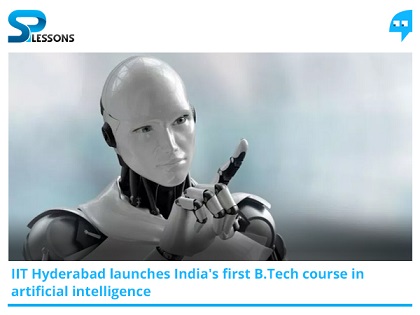 Introduction
Introduction
What is meant by an Artificial Intelligence?
The hypothesis (theory) and improvement of PC frameworks ready to perform tasks ordinarily requiring human insight, for example, visual observation, discourse acknowledgment, basic leadership, and interpretation between dialects (languages). The article IIT Hyderabad - Artificial Intelligence presents the key points related to Artificial Intelligence was introduced by IIT Hyderabad and its planning towards Artificial Intelligence.
 IIT Hyd
IIT Hyd
The Indian Institute of Technology Hyderabad is a public engineering and research institution located in Sangareddy district, Telangana, India. IITH was founded in 2008, among the eight young Indian Institutes of Technology (IITs). It has 285 Undergraduate, 395 Masters and 474 Ph. D. students with 181 full-time faculty. In 2018, IIT Hyderabad was ranked 9th, among engineering institutes in India by the National Institutional Ranking Framework and 22nd overall.The institute was placed under top ten institutes for three years, consecutively. IIT Hyderabad is officially recognized as an Institute of National Importance by the government of India.
 IIT Hyd - AI
IIT Hyd - AI
The Indian Institute of Technology (IIT), Hyderabad will launch a full-fledged B Tech program in Artificial Intelligence (AI) from the coming academic year (2019-2020). Admissions to the course will be accepted based on the JEE Advanced score. With this, the institute claims it has become the first Indian educational institution to offer a full-fledged B Tech programme in AI. IIT-Hyderabad is also the third institute globally after US-based Carnegie Mellon University and Massachusetts Institute of Technology (MIT).
The course will have an intake of around 20 students and the admission will be done on the basis of the JEE-Advanced score. Taught by the department of AI, IIT-Hyderabad, the course syllabus will comprise of the study of algorithms from the computer science department, signal processing from the electrical engineering department, robotics from mechanical engineering department and mathematical foundations. The course will also focus on application verticals such as healthcare, agriculture, smart mobility, among many others.




